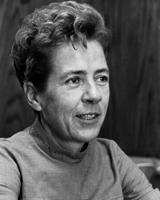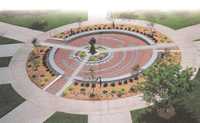
PJ Wyatt
is honored with a Brick from Anita Skeen.
 There are as many stories about P.J. Wyatt as there are people who knew her. Each of those stories, though there are thousands, is different, because P.J. had a special, personal, non-duplicatable relationship with everyone she knew. I knew her for twenty-one years, from the time I came to Wichita State in 1972, a brand-new university professor in a town and state and part of the country where I knew no one, until she died in 1991.
There are as many stories about P.J. Wyatt as there are people who knew her. Each of those stories, though there are thousands, is different, because P.J. had a special, personal, non-duplicatable relationship with everyone she knew. I knew her for twenty-one years, from the time I came to Wichita State in 1972, a brand-new university professor in a town and state and part of the country where I knew no one, until she died in 1991.
I can say with no hesitation that my life would have been much different had not P.J. taken me into her life, her friendship, her love. I would like to tell all the stories I know about her as a way of sharing her uniqueness and a way of keeping her alive but that isn't possible, so I will summarize all those stories in a few sentences:
She was the finest teacher I ever knew. She loved learning, she loved language, and she cared about every student in her classroom, while they were there and for years afterward.
She was a humanist, a philanthropist, a giver of gifts, a giver of joys. She lived simply and shared generously.
She was a keen observer of life, a poet who didn't writer poetry but who spoke it, lived it, passed it on.
She was a musician, a storyteller par excellence, a collector of folk music and folk tales, an historian of Native American art and culture and language, a carver of tiny wooden animals, a sketcher of faces that stuck in her memory.
She knew how to play.
She knew how to say "I told you so, knucklehead" without ever saying it.
She knew when to offer help, and when to let you muddle through on your own.
She was modest, unassuming, irritated by praise and attention. She would be furious that I have said all these things about her and made them public. But I will take my chances because, always, in life, we worked things out.
The Russian poet Yevtushenko, in a poem called "People," which P.J. gave me a copy of when we both taught in the English Department at Wichita State, talks of the individuality of each human life. "When people die, worlds die with them," says Yevtushenko. "Their secret worlds are not regenerated." There will never be another P.J. Wyatt. But the one there was wonderful, and each of us whose life she touched was enriched beyond measure, and though she is gone, she will never leave us.
That's what I tried to say in this poem:
"The Visit"
for P.J. Wyatt
Tonight, you appear to me in dreams, slipping out
of the husk of your illness, walking
into my sleep for the last chat
I knew we'd never get. You lean
in your blue workshirt and cut-offs
against the oak frame of the back door
the way I used to find you
when I arrived early for meals.
I'm not surprised, though neither of us
has lived in that house for ten years
and you lie imprisoned in your body
a thousand breaths away.
As I see you now, I think of those summer
trips into the Flint Hills looking for
fossils and blue heron, the tennis matches
I could never win, the evenings by the fire
with Aunt Rhody and Amazing Grace.
You've put on weight for this occasion,
your clear eyes released from their catacombs
of pain.
What words did you come to bring me,
linguist of my heart? I've let your message
drown in the murmurs of sleep,
and I only recall the final phrase
you saved until just before you floated
from the dream into another room,
another place, saying how we did get to talk
again, didn't we, that "never" is a word
you never use. I take that to mean
you're coming back.
I feel an urgency you don't
and you light up a Camel before you go,
passing through the back door
into the shadows, showing me it's always been
the ordinary, the non-spectacular fact
of your presence that spoke the most
as you pitch your tent tonight,
cigarette tip flickering
among distant stars,
in the back yard
of my life.
Submitted by Anita Skeen
July 28, 1998










